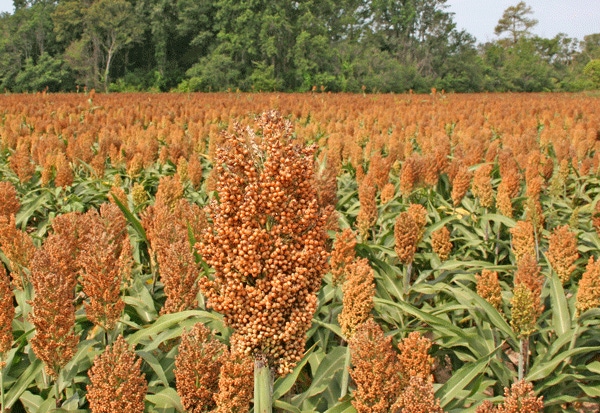
Sorghum seed shortage developing in Upper Southeast
• Growers need to plan ahead and contract seed early to insure an adequate supply and to review state Official Variety Trial testing of grain sorghum to determine several alternative varieties that will work best in their particular farming operation.
April 10, 2013

Grain sorghum acreage in North Carolina jumped from about 10,000 acres in 2011 to 70,000 acres last year.
Whether the continued rise in acreage makes to the magic 100,000 acre mark this year is likely to be in large part determined by the availability of high quality seed.
Long-time agriculture leader and current executive director of the North Carolina Grain Growers Association Dan Weathington, says, “I’ve been in and around the seed business for a long, long time, and I can tell you it takes time to build a seed supply. It’s really tough when you’re trying to increase acreage as much as we’ve done in North Carolina.”
Weathington says 100,000 acres may be possible in 2013, but it will take a lot of coordination among seed dealers and growers.
It may also take some significant coordination by Murphy-Brown, the North Carolina grain buying company which has been the primary impetus for increased sorghum production in the state and in border areas of South Carolina and Virginia.
Barney Bernstein, a senior associate with North Carolina-based Entira, who works as a grain consultant for Murphy-Brown says, “On April 2, Murphy Brown issued a statement to growers, speaking to the need for farmers to contact their retailers to line up seed.
“Most of the distributors I’ve spoken with are out of inventory at their main warehouses, but have limited seed available at retail locations.
“Due to the limited shelf life of seed they are reluctant to purchase more until they sell out at retail locations,” he says.
“Our concern is that with the complex cropping options Southeast growers have, they often wait until they need seed to buy seed. If farmers wait this year, we will run into a shortage, primarily because there won’t be enough time to treat, bag and transport seed from primary seed production areas in Texas.
Some brands already short
“I believe there is sufficient seed available to cover any growth we see this year, but not in Dekalb or Pioneer brands. So the retailers have to walk growers through their seed options,” he says.
“Small grain researchers at Clemson, Virginia Tech and North Carolina State universities are confident in performance of alternative varieties. We just need farmers to think ahead and get this process started by expressing their interest in sorghum seed now, he adds.
Sorghum planting intentions are way up this year, especially in the High Plains. This has exacerbated lower inventory from two below average seed production years (2011-2012), Bernstein says.
In their statement to current and prospective growers, Murphy-Brown urges them to plan ahead and contract seed early to insure an adequate supply and to review state Official Variety Trial testing of grain sorghum to determine several alternative varieties that will work best in their particular farming operation.
There are a number of quality grain sorghum hybrids available.
Research conducted at North Carolina State University, Virginia Tech University and Clemson University in 2012 tested up to 45 different sorghum hybrids and saw good yield and agronomic results with many of them across multiple seed brands, Bernstein says.
Some of these seed brands include DynaGro from CPS, TriGene , Gaylan Ward and Sorghum Partners from FCI, Helena, Meherrin or Southern States. Summary charts from this research are detailed in the 2012 yield testing and performance tables that can be found at www.mbgrain.com.
Bersnstein says, “Farmers interested in planting sorghum should contact their local CPS, FCI, Helena, Meherrin or Southern States locations to confirm their interest in seed.
“And, distributors need to understand farmer needs as early as possible to make sure they have enough seed to meet demand,” he adds.
In their 2013 program, Murphy-Brown will pay 95 percent of harvest cash price of corn for sorghum delivered to select delivery points. Pricing can be locked in anytime during CBOT trading hours prior to Dec. 1, 2013.
Want access to the very latest in agriculture news each day? Subscribe to Southeast Farm Press Daily.
You might also like
Fire ant rafts can be 'great balls of fire'
Weather can influence cotton insect infestations
New trading hours for CBOT, KCBT expected to improve liquidity, market performance
Well-conditioned cows will rebreed sooner
About the Author(s)
You May Also Like





